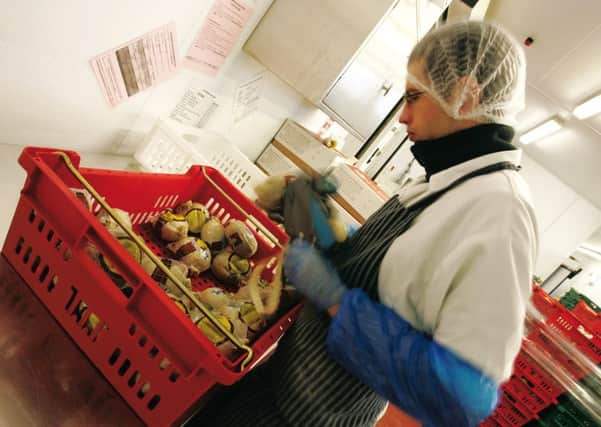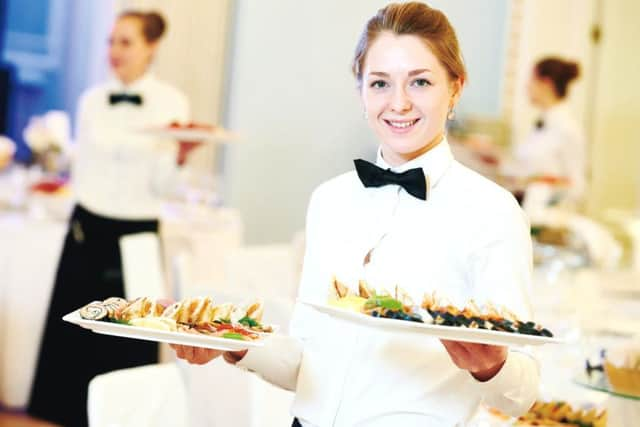Food and drink industry calls for talent on tap


The creation of the Scotland Food & Drink partnership in 2007 brought a renewed focus to the skills agenda. As a sector, food and drink has come a long way in that decade, but people and skills remains an area in need of investment.
The first Skills Investment Plan was published in June 2012 with input from Skills Development Scotland (SDS), Scotland Food & Drink and the Scottish Government.
Advertisement
Hide AdAdvertisement
Hide AdIt had aims of bringing clarity to the scale and nature of the skills facing the sector, bringing focus to the scale and nature of the response required by both industry and the public sector to address these, and providing a framework for public and private sector investment in skills development to meet the needs of the industry.


A revised plan was published in January, setting out what still needs to be done to counter the challenges faced by businesses operating in Scotland’s growing food and drink industry.
“The Skills Investment Plan is very much aligned with Ambition 2030,” explains Gerry McBride, strategic relations manager, food and drink at SDS.
“One of the key things we are working on at the moment is creating a talent pipeline for the sector in recognition that the sector is growing.
“We are looking at all areas but there is a recognition that with new technology there is going to be a need for higher-level skills within the sector, people with ICT skills and engineering skills who will be able to work with the ever-changing technology in the industry.”


SDS is developing a whole raft of new apprenticeship frameworks, from a foundation apprenticeship in food and drink to pique interest among school-age learners, to a craft brewing apprenticeship and a potential distilling programme in line with the trend for producing beer, gin and whisky in Scotland.
“We are also looking at developing a new graduate-level apprenticeship and that is very much focused on food science and food technology roles,” adds McBride.
“Supermarkets are putting pressure on manufacturers to come up with new products and food scientists and food technologists are really critical in bringing those to market.”
Advertisement
Hide AdAdvertisement
Hide AdThe apprenticeships aren’t just aimed at new entrants either, with a real importance placed on businesses upskilling their existing workforce.
“Businesses also use [Modern Apprenticeships] for workforce development to upskill their current workforce and make sure they are more ambitious, more productive, and that they feel valued in that business,” says McBride.
But while the plans laid out are pointing in the right direction and work is under way to ensure people with the right skills are coming into the industry, there are other challenges which don’t necessarily relate to qualifications on paper.
For the most part, they apply to the food service and hospitality industry as opposed to manufacturers and producers, but the two are not mutually exclusive in the barriers they face.
Rural businesses and those in remote areas are the hardest hit.
“From our own business perspective here on the Isle of Skye, I am concerned about everything from a rural point of view,” says Shirley Spear, co-owner and former head chef at the Three Chimneys in Skye, and food and drink ambassador for the Highlands and Islands.
“I believe we are facing challenges in rural areas that perhaps the restaurant industry doesn’t face in towns and cities on quite the same scale.”
She highlights mobile phone coverage and connectivity which can be less reliable in rural areas and, with society so reliant on being online, it can be hard to attract the right staff.
Advertisement
Hide AdAdvertisement
Hide Ad“Business is at a distinct disadvantage competitively due to poor connectivity,” says Spear.
Then there are issues around infrastructure and transport. “Although the journey to Skye is very beautiful, it is a long and tedious one, particularly on public transport.
“Once young people do move here we have issues with local transport, which is virtually non-existent in many parts of Skye and infrequent.
“For a number of years my ex-head chef refused to appoint anybody who couldn’t drive and didn’t own their own car.
“We have long abandoned that necessity just because we couldn’t find enough people with that capability.
“Transport to and from work is a big expense for the business.”
Affordable housing is another problem when it comes to recruiting the right people.
“It has become increasingly difficult to rent or for young people to buy affordable property, or find old-fashioned ‘lodgings’ for others who may be working with us for only a set number of weeks,” says Spear.
Advertisement
Hide AdAdvertisement
Hide Ad“We need a very professional, highly-trained and skilled team in order to operate at gold five-star level all year round.
“The extent of knowledge and skills we demand of our team compared to the early years is enormous.
“I don’t think the Scottish government, or local government, is listening hard enough to our concerns to help the hospitality and tourism sector with all of the issues mentioned.
“They are extremely realistic and very challenging for us and have a profound effect upon small businesses every day.”
According to Spear, a stronger emphasis on home economics classes in schools is required to ignite interest in food and drink preparation at an early age.
“I know from my recent term of work on the Scottish Food Commission there has been less and less emphasis on learning home economics, and study at further education level has diminished at a result.
“This could help towards encouraging study in professional cookery, for example, which could lead to excellent jobs in hospitality.”
SDS is working with schools across Scotland to promote careers in food and drink and showcase the different roles the industry requires from chefs to marketing and brand managers to farmers and food scientists.
Advertisement
Hide AdAdvertisement
Hide Ad“We have our My World of Work service which is an online channel that we deliver in schools with bespoke food and drink industry pages,” explains McBride.
“We have video case studies with inspirational people who work in the sector talking about their route in and how much they enjoy their roles.”
There’s also SDS’s food and drink ambassador network which sees a range of people from apprentices to managing directors visiting schools and attending careers fairs to offer advice and share their own experiences.
“We have a national programme where we link up a business and a school,” continues McBride.
“We have had a biscuit manufacturer that went to a school to come up with an idea for a new product.
“They asked pupils to come up with a marketing strategy, a pricing strategy and the pupils worked in different teams.
“They then presented their work back to the business and through that the different roles within the business were highlighted, but it is also good in terms of a business raising its profile in the local community.”
The Three Chimneys is an example of a business which invests in its staff and Spear is not alone in her understanding of the value that comes from enabling employees to develop and progress in the industry.
Advertisement
Hide AdAdvertisement
Hide Ad“As a business, we support the Hospitality Industry Trust (HIT) scholarships because they assist members of our own team to develop their careers while they are working with us and we provide opportunities for others to spend time with our team here on Skye.
“We are involved with the local branch of Developing the Young Workforce. We also provide professional training opportunities through the Wine and Spirit Education Trust and the Royal Academy of Culinary Arts.
“Scottish businesses need to lead the way and participate in encouraging young people to join the workforce as a serious career choice.”
Employment outlook
– 114,700 people employed in farming, fishing, food and drink in Scotland in 2015.
– 27,000 new job opportunities expected to emerge in the next ten years.
– Agriculture is the largest sub-sector of the industry in employment terms, accounting for 56 per cent of all jobs in the sector.
– More than a third of people working in the food and drink sector are employed in skilled trade occupations.
– 1,500 Scottish companies supported with leadership development by Scottish Enterprise each year. Ten per cent of those are in the food and drink sector.
Advertisement
Hide AdAdvertisement
Hide Ad– Scottish Enterprise account-managed food and drink companies invested nearly £4 million in organisational development between 2013 and 2016.
– 96 per cent of registered businesses in the food and drink sector are small (micro) businesses employing fewer than ten people.
– 1,200 Modern Apprenticeship starts on food and drink related frameworks in 2014/2015, accounting for 5 per cent of all Modern Apprenticeship starts in 2014/2015.